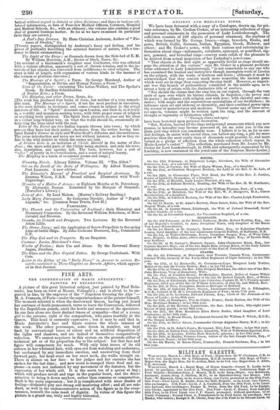ANCIENT AND MEDLEVAL RINGS.
We have been favoured with a copy of a Catalogue, drawn up, for pri- vate reference, by Mr. Crofton Croker, of an interesting collection of rings and personal ornaments in the possession of Lady Londesborough. The collection consists of 250 objects of personal ornament, the nucleus of which was formed by Mr. George Isaacs,—rings, bracelets, fibula3, and gems, British, Gallic, German, Italian, Egyptian, Greek, Hebrew, and others : and Mr. Croker's notes, with their curious and entertaining in- formation about rings—talismanic, cabalistic, episcopal, or pontifical, sig- net, gemmel, and betrothal rings—convey some relish of the pleasure to be derived from actual inspection of her Ladyship's jewel-case.
"That objects at the first sight so apparently trivial as rings should en- gage the attention of the curious," says Mr. Croker in a pleasant prefatory letter addressed to Lady Londesborough, "is not remarkable to any one who has examined the learned and instructive though incomplete work of Licetas on the subject, with the works of Gorlieus and Gorio • although it must be acknowledged that they contain much more respecting the ancient gems which were set in rings than respecting the ring itself. However, so import- ant was this branch of goldsmithery considered in the middle ages, as to invest a body of artists with the distinctive title of one:len.
"Nor should the claims that the ring has on our regard, through the vast cycle of ages over which its history extends, be forgotten —its power and its poetry ; its alliance with religion and with love ; with Chivalry and com- merce; with magic and the superstitious speculations of our forefathers ; its influence upon art and alchemy or chemistry, and their combined power upon the science of manufactures and medicine. Viewed under any of these seve- ral aspects, volumes might be written upon the ring, and the amount of thought or ingenuity of fabrication which,
" • Through climes and ages,'
have been bestowed upon personal decoration.
"But, Madam, beyond all the rings and personal ornaments which you now possess, or hereafter may become possessed of, let me refer you to the one plain gold ring which you constantly wear. I believe it to be, as far as cor- dial feelings, in union with sacred rites, can hallow any ring, a gift far more precious than the most costly tiara of diamonds could possibly be, and more valued as a pledge of affection than the whole collection which repose in Marie-Louise's casket." [The collection, purchased from Mr. Isaacs by Mr. Croker for Lord Londesborough, in 1850, and subsequentlyuugmented by his Lordship, is now contained in the jewel-case of the Empress Marie-Louise.]
























 Previous page
Previous page